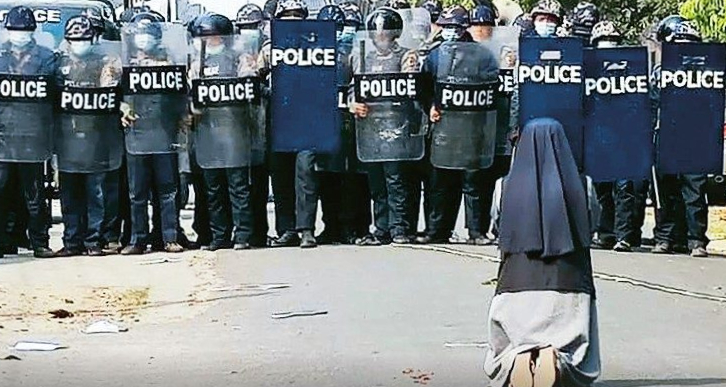“My first objective was to save those youngsters, I didn’t think of my life . . . even though knowing that I was risking my life I thought ‘it’s enough that I save the people.’ So the young people were able to escape. Then I was astounded to be still alive . . . that night I thought “I’m dead, my soul is spinning . . .” I couldn’t explain it to myself, I was also astonished, said Sister Ann Rose Nu Tawng, the courageous Sister of Myanmar, recalling the gripping moments that saw her kneel in front of the cops and military men that were repressing the protests in the Square. It was an image that went around the world.
The Religious of the Sisters of Saint Francis Saverio was connected from Myitkyin, capital of the northernmost state of Myanmar – Kachin – where she lives and works as a nurse. The occasion was the presentation of the instant book “Kill Me, Not the People.” Myanmar’s courageous Sister tells her story in the book, published by Editrice Missionaria Italiana). The presentation was also attended by Gerolamo Fazzini, co-author of the book; Andre Monda, Director of L’Osservatore Romano, and Burmese Jesuit Joseph Buan Sing.
In Defense of Young People
“The first time I did this gesture, on February 28, I was working in the Clinic. I heard the cops’ voices and I went out. I hadn’t given it any thought; I didn’t imagine or plan it. It came to me spontaneously. I only wanted to defend those people, so that those young people could escape the danger,” explained Sister Ann Rose.
I felt profoundly the action of the Holy Spirit, who pushed me to do this. God made use of me to save those people.” But the repression didn’t stop and then “many wounded people arrived. To save them, I had to take them to another hospital. With the help of other young people, I took them with the scooter.”
Controlled by the Military
The second time Sister knelt down was on March 8. At that point, she ended up in the sights of the military. “I put a mask on not to be noticed; the cops asked mi general information, my telephone number, where I was living . . . At that moment I didn’t know that my photo had arrived in the mass media; in any case, I put the mask on not to be noticed. I was afraid. Even my Superiors told me to be prudent. I didn’t want to put anyone’s life in danger.”
Reactions to her gesture were diverse. “The first time, when they discovered what I had done, my Superiors, friends and fellow Sisters were very worried. There were those that encouraged me, who said they were proud of me, some wept, others, instead, reprimanded me, admonished me to be careful, not to risk my life. In any case, I wanted to remain standing to defend the truth, to save the people and for the sake of justice,” stressed Sister Ann Rose.
The Danger Continues
The nun still feels she is in danger. “I believe there is still risk for me. The cops came to the Clinic; they questioned me, took pictures of me but they have yet to touch me. Therefore, my Superiors have suggested I not go out often and when I have to engage in services and go from inside, through the church. One night a lady came to give birth and I went out without a torch, into the night, hidden, to help her.”
The situation hasn’t improved. “At present, the protests continue. Young people seek every possible way to manifest; the cops shoot, beat them but in any event, the young people continue to protest. During the conversation I had with them the cops said to me ’we don’t want to shoot or kill anyone, we only want to scare them, as a father with a son to educate him,’ but then they said they had to follow orders,” continued Sister Ann Rose.
All Ask for Democracy
The history of Christians in Myanmar is a history of suffering, as Sister Ann Rose’s personal suffering. “When I was little my family suffered a lot; we had no freedom. Even those with a degree couldn’t work in the State. We are a minority and the government has always persecuted us, it has not given us many possibilities to work. Being a Buddhist country, more respect is accorded Buddhist monks and nuns. Priests and Sisters haven’t always been respected in the past. Now Christians are beginning to be respected more. There aren’t any strong tensions; before there were barriers between the religions, now those barriers have collapsed. The people have come together; they only want freedom and democracy.”
Sister Ann Rose explained: “prayer helped me a lot, in moments of persecution prayer is essential. Adoration of the Blessed Sacrament gave me the strength; I drew strength from there to behave as I did. Prayer helped me to serve people without distinctions, to treat all in the same way. And then there is the gesture of kneeling. There are those who think it is a loser’s gesture (this is Father Peter’s translation, the Burmese priest who was the interpreter and who works in a parish of the Roman periphery, ndr.). But it isn’t. It’s a gesture of reconciliation, of forgiveness of the enemy, and it’s useful also in families.”
“I Will Ask the Holy Father . . . “
The nun’s last thought is for the Pope, who many times has asked and prayed for an end to violence in Myanmar. “I would like to thank the Holy Father for his willingness to celebrate Mass with the Burmese community; I’m very proud of him. The figure of the Holy Father is certainly international; his words are a great help; they are worth tons of money; all nations will pay attention to his addresses. If I have the occasion to speak with the Holy Father, I would like to ask him to invite the Heads of Nations to take care of us. In three months, 800 people have died. I would like to ask him to help us to save our people and the future generation.”
“So I asked the Pope to celebrate the Mass for the children.”
Father Joseph explained how the initiative of the Mass was born, which the Holy Father will celebrate next Sunday for the Burmese community.
“I’ve been in Rome for a year; before I taught. My students escaped; they are in the forests. Instead of a pen they now have a pistol. I can’t sleep; I can’t talk with them. I’ve had friends, students, and relatives that have died. Now I won’t return to my country because I won’t be able to do anything. I wrote to the Pope to ask him for the Mass. On April 25, together with priests and Sisters, we were in St. Peter’s Square with two banners, ‘Pray for Myanmar” and ‘Thank you.’ Two days later I was telephoned from the Vatican saying to me that the Pope had read the letter and agreed to celebrate the Mass. I cried with joy.”
People from all over Italy will come, among them, two PIME Burmese Deacons, who will come from Monza; other Sisters of Sister Ann Rose’s Congregation from Lecco. Only 190 people will be present, given the limitations of the pandemic.
The Significance of the Book
“With this book, we wanted to give due importance to Sister Ann Rose’s testimony, less the track is lost of what it meant. Then we want the situation in Myanmar to be known better; the troubled history of a people that has a common thread with Italy which would be rediscovered.” In fact, the first missionaries in the 18th century were Italian Barnabite Fathers. The evangelization passed to PIME, that country’s five martyrs in what was then Burma. Three other PIME Italian figures have been important for Myanmar in more recent times: Brother Felice Tantardini, whose Cause of Beatification is underway; Blessed Clemente Vismara and Father Cesare Colombo, creator of a leper colony in the 50’s who has been taken as a model by the World Health Organization.










